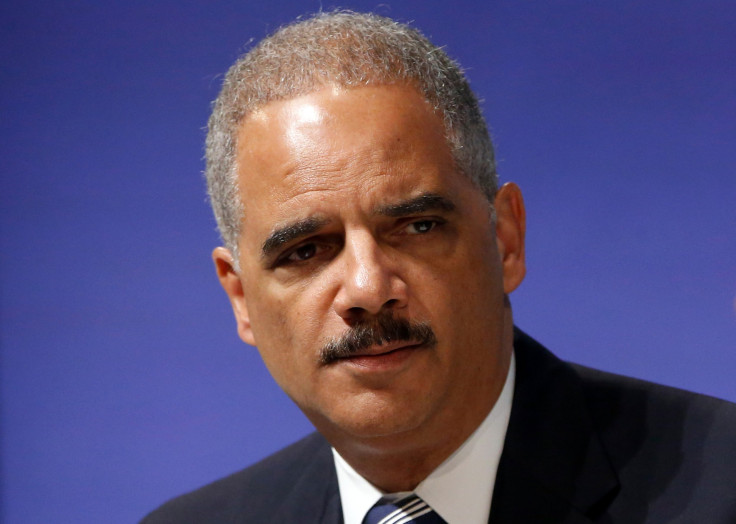Ferguson Grand Jury Update: Holder Asks Police To Be Peaceful Ahead Of Darren Wilson Decision

U.S. Attorney General Eric Holder asked police and protesters in Ferguson, Missouri, Friday to act peacefully ahead of a grand jury’s decision on whether to bring charges against Police Officer Darren Wilson for the fatal shooting of Michael Brown in August. The decision is expected on Sunday, according to the Huffington Post.
“The Justice Department encourages law enforcement officials, in every jurisdiction, to work with the communities they serve to minimize needless confrontation,” Holder said. “It is vital to engage in planning and preparation, from evaluating protocols and training to choosing the appropriate equipment and uniforms.”
Wilson, a 28-year-old white police officer, shot and killed 18-year-old Brown, an unarmed black student, after a street confrontation between the two on Aug. 9. There are conflicting reports about whether or not Brown was surrendering or was moving aggressively toward Wilson. The grand jury is expected not to charge Wilson, according to the Washington Post, and there are reports Wilson will resign from the Ferguson Police Department. Large, potentially violent demonstrations are expected.
Holder also urged community members to act with restraint and “look to those examples [of peaceful protests] as they work to bring about real and lasting change for themselves and for future generations.”
Holder went to Ferguson on Aug. 20, when tensions were at their highest, to meet with FBI officials investigating the case and with local leaders. He vowed he would work with both police and the public to “ensure that this tragedy can give rise to new understanding – and robust action – aimed at bridging persistent gaps between law enforcement officials and the communities we serve,” according to NBC.
A handful of fatal incidents between black citizens and police officers since Brown’s shooting have kept protests alive around St. Louis, which in some cases have devolved into violence. During some of these violent clashes, churches have opened their doors to those seeking refuge. Many are now preparing for an influx of people in the coming weeks as tensions mount regarding the grand jury decision, according to a report by the St. Louis Post-Dispatch.
Below is the full text of Holder’s message, courtesy of the Justice Department:
“At the United States Department of Justice, we are committed to ensuring that our local law enforcement partners have the resources they need to effectively serve and protect all members of their communities, particularly when citizens exercise their constitutionally protected rights. To that end, the Bureau of Justice Assistance and the Office of Community Oriented Policing Services are providing new guidance to law enforcement officers about how to approach maintaining order during First Amendment-protected events. This comprehensive new guide compiles information, tools, and best practices that will help law enforcement officers maintain public safety while safeguarding constitutional rights.
“As we’ve seen, durable relationships between the police and their communities do not develop overnight. But as someone who has spent a career at all levels of law enforcement—and as the brother of a retired police officer—I know the importance of these outreach efforts to ensuring effective neighborhood policing, officer safety, and community health. The Justice Department encourages law enforcement officials, in every jurisdiction, to work with the communities they serve to minimize needless confrontation. It is vital to engage in planning and preparation, from evaluating protocols and training to choosing the appropriate equipment and uniforms. This is the hard work that is necessary to preserve the peace and maintain the public trust at all times—particularly in moments of heightened community tension.
“Over the past few months, we’ve seen demonstrations and protests that have sought to bring attention to real and significant underlying issues involving police practices, implicit bias, and pervasive community distrust. And in most cases, these demonstrations have been both meaningful and responsible, and have brought vital issues to the attention of the public at large. Similarly, the vast majority of law enforcement officers have honorably defended their fellow citizens engaged in these peaceful protests.
“I know, from first-hand experience, that demonstrations like these have the potential to spark a sustained and positive national dialogue, to provide momentum to a necessary conversation, and to bring about critical reform.
“But history has also shown us that the most successful and enduring movements for change are those that adhere to non-aggression and nonviolence. And so I ask all those who seek to lend their voice to important causes and discussions, and who seek to elevate these vital conversations, to do so in a way that respects the gravity of their subject matter. Peaceful protest has been a hallmark, and a legacy, of past movements for change, from patriotic women who demanded access to the franchise, to the civil rights pioneers who marched for equal rights and equal justice. Americans exercising their First Amendment right to free assembly should look to those examples as they work to bring about real and lasting change for themselves and for future generations.
“Of course, I recognize that progress will not come easily, and long-simmering tensions will not be cooled overnight. These struggles go to the heart of who we are, and who we aspire to be, both as a nation and as a people—and it is clear that we have a great deal of important work to do. But as we move forward, the Department of Justice — and I personally — will continue to work with law enforcement and communities throughout the country to help build the more perfect Union — and the more just society — that all Americans deserve.”
© Copyright IBTimes 2025. All rights reserved.






















